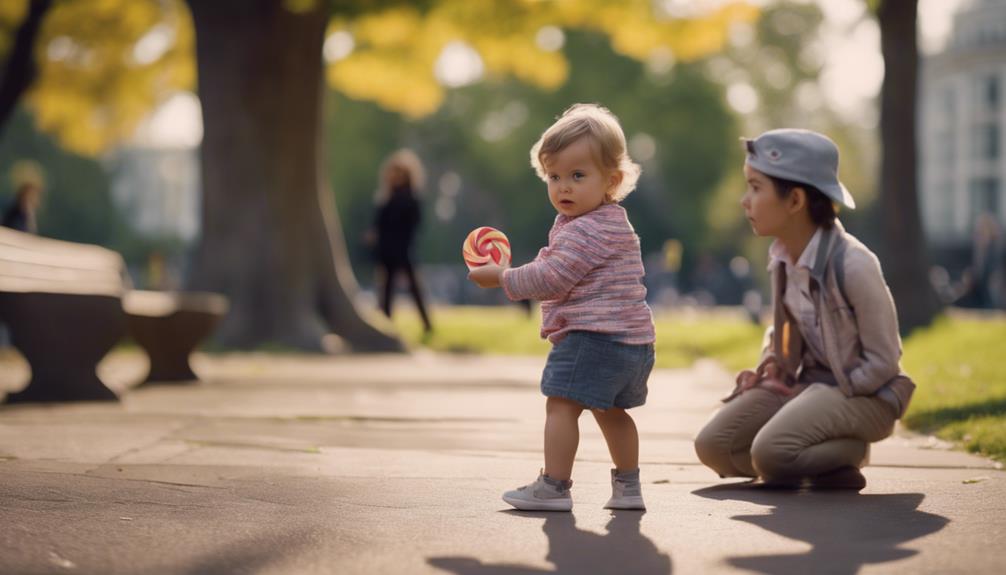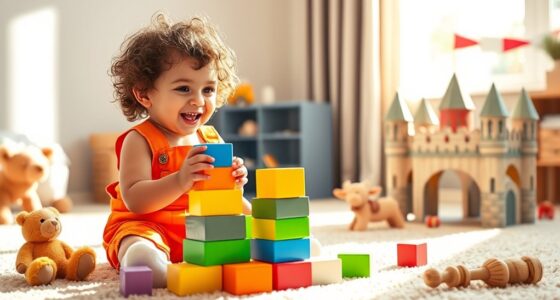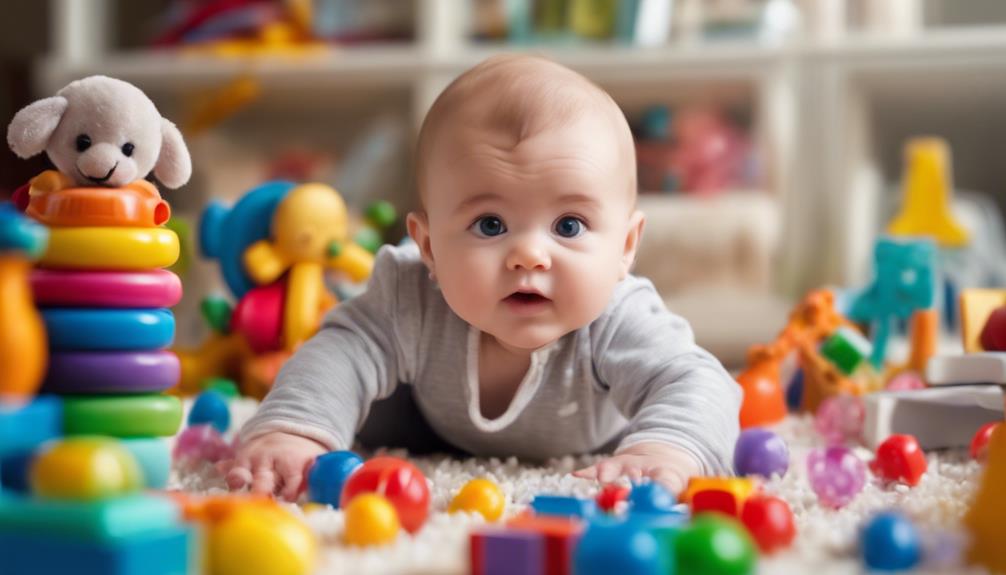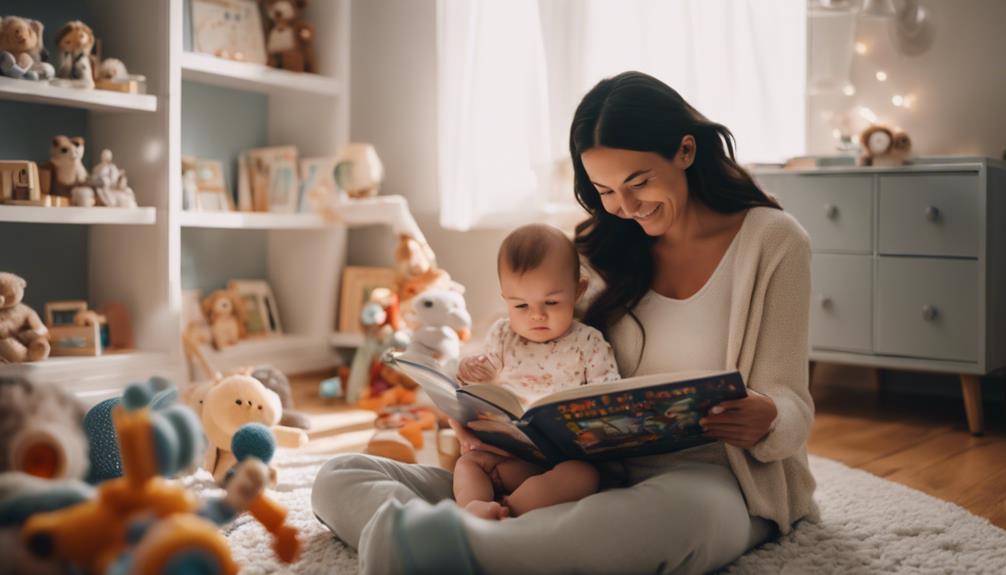Discover the progression of your baby’s brain development as they grow month by month, beginning with prenatal stages that shape neural connections. Newborns demonstrate reflexes that indicate healthy motor skill development. During 1-3 months, focus on visual tracking and hand-eye coordination. From 4-6 months, you’ll notice advancements in language and fine motor skills. Progress continues at 7-9 months with milestones like crawling, sitting, and social interaction. As you reach 10-12 months, pay attention to language development and further refinement of motor skills. Between 12-24 months, anticipate an expanded vocabulary and improved problem-solving abilities. By 24-36 months, social skills and emotional regulation will continue to develop. Delve into the complexities of your baby’s cognitive journey.
Key Takeaways
- Brain development progresses rapidly in newborns, forming crucial neural connections.
- Newborns exhibit sensory responses like turning towards sounds and showing interest in faces.
- Reflexes like Moro, rooting, and grasping indicate neurological health and motor skill development.
- By 1-3 months, babies develop visual tracking skills and hand-eye coordination.
- Advancements in language development, fine motor skills, and social interaction occur from 4-6 months.
Brain Development During Pregnancy
During pregnancy, your baby's brain undergoes significant development, forming essential neural connections for various functions even before birth.
The brain stem and cerebellum play pivotal roles in enabling basic functions like swallowing and breathing while still in the womb. These early neural connections aid in movements even before birth, showcasing the remarkable development of your baby's brain.
As the pregnancy progresses, the fetus's hearing starts to develop, allowing them to respond to sounds in the environment by the second trimester.
By the third trimester, the brain begins to separate into right and left hemispheres, laying the foundation for more advanced cognitive functions post-birth.
Additionally, prenatal experiences and interactions are crucial in shaping the brain's structure and function before your baby arrives, highlighting the importance of a supportive and nurturing environment even during pregnancy.
Newborn Brain Development Milestones

As your newborn enters the world, their brain is already a quarter of its adult size, packed with billions of neurons waiting to connect.
Your baby's vision may be limited, but they can track objects and faces, displaying early signs of visual development.
From reflexes like sucking and grasping to being highly responsive to sounds and voices, your newborn is showcasing important early brain functions.
Neonatal Brain Growth
In the early stages of life, your newborn's brain undergoes rapid growth, establishing essential foundations for future development. By birth, the baby's brain has already grown to about 25% of its adult size, with necessary structures for functions like breathing and heart rate in place.
The neonatal brain development is marked by a flurry of activity, creating millions of synapses every second. These synapses form the connections that pave the way for cognitive, social, and emotional growth in the future.
Additionally, sensory pathways for hearing, touch, and taste are active right from the start, allowing your baby to begin processing and reacting to the world around them. This early period of neonatal brain growth is critical in setting the stage for further brain development milestones as your baby grows and learns.
Early Sensory Responses
Your newborn's early sensory responses play an essential role in their brain development, setting the stage for future cognitive and social milestones. Newborns exhibit remarkable abilities such as turning towards sounds and showing interest in high-contrast patterns. They have a natural inclination towards human faces and voices, showing an early recognition of social stimuli.
Additionally, newborns possess a heightened sense of smell, enabling them to distinguish familiar scents, especially that of their mother. Touch is another critical aspect of newborn brain development, with skin-to-skin contact fostering bonding and aiding in emotional regulation.
While newborns have limited vision at birth, they can track moving objects and are sensitive to light and dark contrasts. These early sensory responses pave the way for the development of more complex cognitive functions and social skills later on.
Encouraging interactions that involve sensory stimulation, such as gentle touch and exposure to different sounds and sights, can further support your newborn's brain development during this crucial stage.
Reflex Development Stages
During the early stages of newborn brain development, reflexes such as the Moro, rooting, and grasping reflexes play an essential role in their motor skill development and overall neurological health. These reflexes are pivotal for survival and serve as indicators of the proper functioning of the nervous system. The presence and disappearance of these reflexes mark significant milestones in a newborn's neurological maturation. By observing these reflex responses, healthcare providers and caregivers can gain insights into the baby's neurological health and early brain connectivity.
The development of reflexes in newborns lays the foundation for their motor skills, helping them interact with their environment and learn essential movements. As the central nervous system matures, these reflexes typically fade away, making room for more voluntary movements controlled by the brain. Monitoring reflex development in newborns is an important aspect of evaluating their neurological development and ensuring that they're on track for healthy growth and motor skill acquisition.
Brain Development at 1-3 Months

During the 1-3 month period, your baby's brain development blossoms as they start tracking objects with their eyes and flashing heartwarming smiles in response to stimuli.
These early social cues and visual tracking skills are important milestones in your little one's cognitive growth.
Encourage their progress by engaging in interactive play and nurturing their budding social interactions.
Visual Tracking Skills
Babies aged 1-3 months gradually develop their visual tracking skills, progressively following objects with their eyes and enhancing their focus.
During this first development month, babies start improving their hand-eye coordination by tracking moving objects. This early brain development stage is vital as it helps babies learn to coordinate their eye movements and strengthen their visual processing abilities.
By the end of this period, around 3 months, babies can track moving objects more smoothly and accurately, indicating healthy visual development. These skills are fundamental for future activities like reading, hand-eye coordination, and overall cognitive growth.
Encouraging activities that promote visual tracking, such as using moving toys or colorful objects, can further support this significant brain development milestone. By engaging with your baby in these activities, you can help enhance their visual tracking skills, setting a strong foundation for their future cognitive abilities.
Social Interaction Cues
At 1-3 months old, your baby begins displaying early social interaction cues by smiling in response to stimuli. This smile isn't just a random facial expression; it's a sign that your little one is starting to engage with the world around them.
As your baby's visual processing abilities improve, they'll begin tracking objects with their eyes, following movements and focusing on interesting shapes and colors. Alongside these advances, you might notice your baby opening and shutting their hands, bringing them to their mouth, and even gripping objects. These actions demonstrate developing hand-eye coordination, an essential skill for future tasks like feeding themselves and playing with toys.
Additionally, as your baby gains more control over their movements, they may start reaching for dangling items, showcasing progress in both motor skills and spatial awareness. These early social interaction cues and physical developments are exciting milestones in your baby's brain development journey.
Brain Development at 4-6 Months

How does your baby's brain develop between 4-6 months of age?
During this period, your baby's development is marked by significant advancements in hand-eye coordination, language development, and fine motor skills.
You'll notice that your little one is starting to reach for and grab objects, enhancing their hand-eye coordination and exploring their surroundings through touch.
Additionally, language development progresses as your baby begins to babble more, imitate sounds, and communicate through laughter, setting the stage for future speech skills.
Moreover, fine motor skills become more refined as your baby feeds themselves using a pincer grasp, points at objects, and engages in early pretend play, showcasing growing independence and dexterity.
These milestones indicate the intricate development happening in your baby's brain at 4-6 months, laying the foundation for continued growth and learning in the months to come.
Brain Development at 7-9 Months

During the period of 7-9 months, significant advancements in your baby's brain development become evident through milestones in motor skills, language comprehension, and social interaction. Your baby is likely starting to crawl, sit without support, and respond to familiar words, showcasing progress in both motor skills and language understanding.
At this stage, you may notice your little one clapping, engaging in simple games, and displaying early signs of social interaction, indicating the growth of social and emotional skills. Cognitive abilities continue to expand as your baby explores the world around them with curiosity and interest.
Physical development includes the ability to pull up to stand, demonstrating improved strength and coordination. Expect your baby to show a growing sense of independence and exploration, becoming more mobile and interactive in their surroundings.
These developments are vital in the baby's first year, laying the foundation for future growth and development in various areas.
Brain Development at 10-12 Months

When your baby reaches 10-12 months, their brain development continues to progress rapidly, leading to notable advancements in both motor skills and language abilities.
At this stage, your little one may master the pincer grasp, allowing them to feed themselves small items like cereals or fruits. You might notice them starting to say one or two simple words, a sign of their advancing language development.
Concerning motor skills, babies at this age begin to cruise around furniture, using it for support as they move around. They also become more explorative, pointing at objects that catch their attention and engaging in pretend play, showing the emergence of imaginative activities.
As they become more mobile, their motor skills advance, enabling them to interact more actively with their surroundings. Encourage and support these developments by providing safe spaces for exploration and opportunities for language practice.
Brain Development at 12-24 Months

Around 12-24 months, your toddler's brain development continues to accelerate, fostering significant advancements in various cognitive and social skills. Language skills see a boost during this period, with toddlers expanding their vocabulary and starting to form simple sentences. Their problem-solving abilities also improve, as they engage in more complex pretend play, stimulating their cognitive growth. Social skills take a leap forward as toddlers begin to show empathy, share toys, and participate in simple interactions with others. To summarize your toddler's progress at this stage, refer to the table below:
| Aspect of Development | Milestones Achieved |
|---|---|
| Language Skills | Expanded vocabulary, forming simple sentences |
| Problem-Solving Abilities | Improved and engaging in complex pretend play |
| Social Skills | Showing empathy, sharing toys, simple interactions |
These advancements in brain development are underpinned by strengthening connections related to memory and learning, which support the rapid cognitive growth observed during this pivotal developmental phase.
Brain Development at 24-36 Months

Your toddler's brain continues its rapid development between 24-36 months, focusing on language, social skills, and emotional regulation. During this pivotal period, neural connections are actively forming to support cognitive functions such as problem-solving and memory. By 36 months, your child's brain is almost 80% of its adult size, underscoring the importance of early experiences and interactions in shaping excellent development.
Language development at 24-36 months marks a significant milestone as children expand their vocabulary and start using more complex sentences to express themselves. This period also sees advancements in social skills, including understanding emotions, forming friendships, and developing empathy towards others.
Emotional regulation becomes more refined during this stage, aiding toddlers in managing their feelings and responses to different situations. Encouraging and nurturing these aspects of your child's development during the 24-36 months period can have a lasting positive impact on their overall growth and well-being.
Gender Differences in Brain Development

In understanding brain development, it's essential to recognize the subtle gender differences that exist in children's cognitive growth. Boys tend to have slightly larger brains than girls, with a slightly higher percentage of brain volume.
Girls may display heightened sensitivity in senses like touch and taste. Research indicates that girls may demonstrate more advanced language skills at specific developmental stages compared to boys.
Furthermore, gender differences can influence the rate at which children acquire language, often showing that girls reach language milestones earlier.
It's important to note that gender assumptions and stereotypes can impact brain development and cognitive abilities in children. By acknowledging and understanding these gender differences in brain development, caregivers and educators can better support each child's unique cognitive journey.
Frequently Asked Questions
What Milestones Should My Baby Hit Each Month?
You should look out for milestones like tracking objects at one month, smiling at two months, grasping things at three months, rolling over and babbling around four to six months, and crawling and responding to words at seven to nine months.
How Do You Know if Your Baby Has High Iq?
Hey, curious parent! Notice advanced language skills, quick learning, and intense curiosity in your little one? Those early signs of high intelligence shine through. Keep nurturing that brilliance with interactive play and varied experiences.
How Does Baby Development Month by Month?
You observe your baby's development month by month by tracking milestones like smiling, rolling over, sitting up, and babbling. It helps confirm that your baby is progressing as expected and gives you insight into their growth.
When Does a Child's Brain Develop the Most?
Your child's brain develops the most rapidly in the first three years of life, with 700-1000 new neural connections forming every second during this period. Early experiences and interactions are essential for shaping brain development.
Conclusion
To sum up, it's fascinating to note that a baby's brain grows to 70% of its adult size by their first birthday. This rapid development showcases the incredible potential and adaptability of the human brain during early childhood.
By understanding the month-by-month guide to baby brain development, parents can support and nurture their child's cognitive growth, setting the foundation for a healthy and thriving future.
Stay engaged and informed to help your little one reach their full potential.









